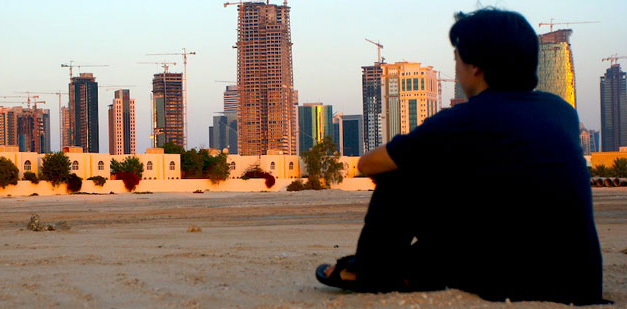A new report from the International Trade Union Confederation estimates that $15 billion profit will be made by companies working in Qatar on infrastructure for the controversial 2022 FIFA World Cup using up to 1.8 million migrant workers who are modern day slaves.
Read the report: Qatar: Profit and Loss. Counting the cost of modern day slavery in Qatar: What price freedom?
The report released on International Migrants Day is critical of Qatar for failing to deliver changes to labour rights or compliance, and warns construction companies, hotels, retail chains and UK and US Universities the cost of doing business in a slave state.
“Every CEO operating in Qatar is aware that their profits are driven by appallingly low wage levels – wages that are often based on a system of racial discrimination – and that these profits risk safety, resulting in indefensible workplace injuries, illnesses and deaths,” said Sharan Burrow, General Secretary, International Trade Union Confederation.
Using new data uncovered in Qatar’s own government statistics, the ITUC estimates 7,000 workers will die before a ball is kicked in the 2022 World Cup.
“Qatar still refuses to make public the actual death toll of migrant workers or the real causes of death. The vast majority of the workers are working to deliver the huge World Cup infrastructure programme by the 2022 deadline. By analysing Qatar’s own statistics and health reports over the past three years, previous reports of 4,000 workers dying by 2022 are a woeful underestimate. The real fatality rate is over 1,000 per year, meaning that 7,000 workers will die by 2022. Qatar hospital emergency departments are receiving 2,800 patients per day – 20% more from 2013 to 2014,” said Sharan Burrow.
Estimates for spending on infrastructure for the 2022 World Cup are as high as $220 billion, involving major international construction companies profiled in the ITUC report from Australia, Europe and the USA including ACS (Spain), Bechtel (USA), Besix (Belgium), Bouygues (France), Carillion (UK), CCC (Greece), Ch2M Hill (USA), CIMIC (Australia), Hochtief (Germany), Porr (Austria) and QDVC (France).
“This crisis goes beyond the borders of Qatar, involving companies across the world who are profiting from the kafala labour system which enslaves workers. The Khalifa Stadium project, a showcase World Cup venue, pays workers $1.50 an hour.
It is estimated that more than 40 percent of the world’s top 250 international construction contractors are participating in projects in Qatar. Shareholders with investments in fourteen different stock exchanges are exposed to the profits using modern day slavery under the kafala system,” said Sharan Burrow.
While the government continues to refuse legal reform, the ITUC is calling on companies there to:
- Give workers exit visas immediately and without condition, and allow workers to transfer to another job;
- Allow workers a collective voice to raise complaints and negotiate together with their employer;
- Establish a single minimum living wage rate for all migrants;
- In the absence of effective government labour inspection or a labour court, ensure fair and effective inspection, compliance and dispute resolution within their operations including subcontractors.
Since the ITUC released its special report The Case Against Qatar in March 2014, nothing has changed for workers in Qatar. The Government has failed to bring its laws in line with international standards and the much promised labour law, which will not come into effect until 2017, adds a new layer of repression for migrant workers.
“Qatar’s labour laws are ruinous for workers. All the government has done is to codify slavery. Employers can now even lend out workers to another employer without the workers consent for up to a year.”
The ITUC has called on the Qatar authorities to take immediate steps:
- End the kafala system starting with the elimination of the exit visa;
- Allow worker representation – a collective voice with elected representatives and workplace committees;
- Employment contracts through direct employment or large, reputable, recruitment companies;
- A national minimum wage for all workers, and collective bargaining rights;
- Proper labour inspection and grievance mechanisms, inclusive of contractors, and an independent labour court.
The ITUC is also demanding that FIFA, which has failed to exert any real pressure on Qatar, to put workers’ rights at the centre of 2022 World Cup preparations.
Watch the ITUC multi-media investigation: Qatar Exposed
(this piece originally appeared on the ITUC news website)

